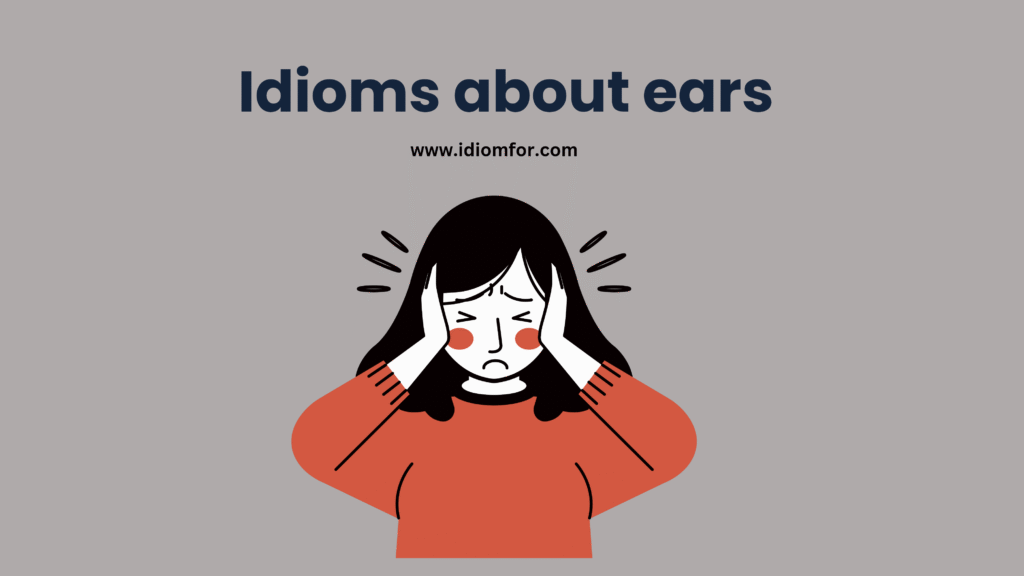Idioms about ears are common in English and are often used in everyday speech. These expressions do not always talk about actual ears but use the word “ear” to describe listening, paying attention, or reacting to sound or words. Learning these idioms about ears will help you speak more naturally and understand native speakers better.
📚 30+ Idioms about ears
1. Play it by ear
Meaning: To decide what to do as things happen, not planning ahead
Sentence: We don’t have a plan for the trip; let’s just play it by ear.
2. Music to my ears
Meaning: Something pleasant to hear
Sentence: Her praise was music to my ears.
3. Lend an ear
Meaning: To listen carefully or kindly
Sentence: Can you lend an ear? I need someone to talk to.
4. In one ear and out the other
Meaning: Quickly forgotten or ignored
Sentence: I told him to clean his room, but it went in one ear and out the other.
5. Keep your ear to the ground
Meaning: Stay informed or alert to new developments
Sentence: Keep your ear to the ground for any job openings.
6. Up to your ears
Meaning: Very busy or involved
Sentence: I’m up to my ears in work this week.
7. All ears
Meaning: Fully listening or paying attention
Sentence: Tell me your story—I’m all ears!
8. Have someone’s ear
Meaning: To have someone’s attention or influence
Sentence: She has the manager’s ear, so he listens to her advice.
9. Prick up your ears
Meaning: Start listening carefully
Sentence: The kids pricked up their ears when they heard the word “ice cream.”
10. Out on your ear
Meaning: To be forced to leave a job or place
Sentence: He was out on his ear after being caught cheating.
11. Wet behind the ears
Meaning: Inexperienced or new
Sentence: Don’t give him hard tasks—he’s still wet behind the ears.
12. Blow it out your ear
Meaning: A rude way to dismiss what someone says
Sentence: If you don’t like it, blow it out your ear!
13. Fall on deaf ears
Meaning: To be ignored
Sentence: His warnings fell on deaf ears.
14. Box someone’s ears
Meaning: To hit someone (old-fashioned usage)
Sentence: He threatened to box the boy’s ears for being rude.

15. Ears are burning
Meaning: Feeling that someone is talking about you
Sentence: Were your ears burning? We were just talking about you.
16. Have big ears
Meaning: To be too curious or nosy
Sentence: Be careful what you say—little kids have big ears.
17. Grin from ear to ear
Meaning: To smile widely
Sentence: She was grinning from ear to ear after hearing the good news.
18. Give an earful
Meaning: To scold or speak angrily
Sentence: Mom gave me an earful when I came home late.
19. Turn a deaf ear
Meaning: To ignore on purpose
Sentence: He turned a deaf ear to her complaints.
20. Out of earshot
Meaning: Far enough away not to be heard
Sentence: Let’s talk when the kids are out of earshot.
21. Pin your ears back
Meaning: Listen carefully (British informal)
Sentence: Pin your ears back—we’re starting the lesson now.
22. Talk someone’s ear off
Meaning: To talk too much
Sentence: She talked my ear off about her vacation.
23. Have your ear to the wall
Meaning: Secretly listening or spying
Sentence: He always has his ear to the wall during meetings.
24. Go in one ear and stay there
Meaning: To remember something well
Sentence: Her advice went in one ear and stayed there.
25. Eavesdrop
Meaning: Secretly listen to a conversation
Sentence: He was caught eavesdropping outside the door.
26. Pick up by ear
Meaning: Learn music by listening, not reading notes
Sentence: He never studied music—he plays everything by ear.
27. Sharp-eared
Meaning: Able to hear well or notice sounds
Sentence: My sharp-eared dog hears everything!
28. Sweet on the ear
Meaning: Pleasing to hear
Sentence: That violin music is so sweet on the ear.
29. With ears wide open
Meaning: Listening very carefully
Sentence: The kids sat with ears wide open during storytime.
30. Talk behind someone’s ear (less common)
Meaning: Gossip about someone secretly
Sentence: I don’t like it when people talk behind my ear.
✍️ Practice for idioms about ears
- I’m __________, so go ahead and tell me.
- His warnings __________ and nobody listened.
- She was __________ after winning the prize.
- Let’s just __________ and see what happens.
- I’m __________ in homework this week.
- He __________ to my advice and avoided trouble.
- That compliment was __________.
- I told him to clean his room, but it went __________.
- When I mentioned pizza, the kids __________.
- Don’t talk now; the teacher is __________.
✅ Answer Key
- all ears
- fell on deaf ears
- grinning from ear to ear
- play it by ear
- up to my ears
- lent an ear
- music to my ears
- in one ear and out the other
- pricked up their ears
- within earshot
🎯 Conclusion
Idioms about ears help bring more color to your speech and writing. Instead of simply saying “he listened” or “she ignored it,” idioms let you express those ideas in fun and creative ways. Practice using them in daily conversation, and you’ll soon sound more fluent and natural in English.
❓ FAQs for Idioms about Ear
1. What does “all ears” mean?
It means you’re fully ready to listen.
2. What’s the difference between “play it by ear” and “pick up by ear”?
“Play it by ear” means acting without a fixed plan. “Pick up by ear” means learning by listening, especially in music.
3. Are these idioms used in formal writing?
Not usually. These are common in casual or spoken English.
4. Is “ears burning” real?
No, it’s just an idiom that means someone might be talking about you.
5. Can kids learn and use these idioms?
Yes! Most of these are simple enough for children or beginner learners to understand.


Pingback: Idioms for Success - Idiomfor
Pingback: 50 Idioms for Breakfast - Idiomfor